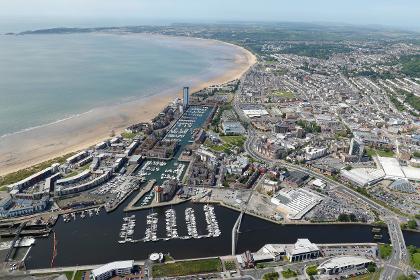Swansea Council’s Cabinet has agreed to go out to consultation on a programme of investment that will see an average £1.9m a day spent on key services like schools, care and community services next year.
Despite services facing huge national energy and inflation pressures totalling £44m and a real-terms cut in Government funding, the council is aiming to spend millions of pounds more in services like education, care and community services the council deliver every day.
A Cabinet meeting today (December 22) agreed proposals for the budget for 2023/24 that will go out for consultation from January 3. After that a further report will come back to Cabinet before it puts its final proposals to full council in March.
Swansea is set to get around £30m in extra funding from the Welsh Government next year – a rise of 7% – against the £45m it would need to maintain services at current levels over the coming year.
However, as U.K. Government has excluded the public sector from any energy help next year, a 300% rise in the council’s energy bills will now fall to the local authority. In addition inflation is at more than 10% and rising demand for council services due to the cost of living crisis is also putting unprecedented pressure on council finances in Swansea and across the U.K.
Swansea Council Leader Rob Stewart, said: ‘These unprecedented national pressures which have local impacts are hugely challenging. The U.K. Government’s decision not to provide any help with school, care and community energy bills means the costs are being passed to local residents. We will continue to lobby U.K. government for help.”
He said: “However we will continue to try and protect jobs and services, while helping our residents through the cost of living crisis. We want to hear from the people of Swansea about the initial budget proposals. No decisions have been made and none will be until the views of residents, trade unions, schools and businesses, among others, have been taken into account.
“The better than expected funding settlement for the coming year demonstrates the Welsh Government has listened to our concerns and recognise the financial challenges we face are not of our making. However it does not cover the full national pressures. The Welsh Government has added to the money announced in the UK Government budget, which is very welcome.
“But record inflation and the cost of living crisis means that Swansea, like all other councils across the U.K., will still face difficult choices in the coming years.”
Cllr Stewart said over the last few years and during the pandemic, the council took a prudent approach to financial management that protected jobs and services and allowed the council to build up its reserves. This has helped cushion the economic blows experienced over the last few months and will assist next year too.
But he added: “Despite the budget settlement being better than we expected, unprecedented inflation and energy costs means we still need to make savings of £25m in the coming year to help offset the extremely difficult national financial challenges which have developed over the last six months, none of which have been of our making.
“We are expecting next year to see our energy costs alone rise by 300% to £20m, which is why our budget proposals include an energy price fund to help schools, our social care homes, community facilities and our leisure services partners manage the challenges they’ll face. We’re also planning other measures that will help protect school and social care budgets.”
In the last few years there have been no compulsory redundancies at the council. However, as around 45% of the council’s overall costs relate to employees it’s anticipated that up to 68 posts will be at risk this time, some of which are already vacant. As the budget process develops and discussions take place with trade unions, it’s expected the figure will go down through initiatives like natural wastage and voluntary redundancy.
No decision has yet been taken on the level of council tax for next year and this will form part of the consultation. The fire authority has asked for an up to 17.5% levy increase which we think is an unreasonable request at this time. We would need to raise council tax by 2% just to cover the fire levy which we think ignores the cost of living pressures residents are under.”
Cllr Stewart said: “Next year we will be investing an average £1.9m every day in services that make a real difference to people’s lives. We know how big an impact the cost of living crisis is having on families because our frontline staff are helping many people deal with the challenges. That’s why we are determined to keep any rise in council tax as low as possible.”
Please donate here: Support Carmarthenshire News Online Thank you for supporting independent journalism and contributing to the future of local news in Carmarthenshire. Carmarthenshire News Online has been dedicated to providing unbiased and trustworthy news, free from commercial or political influence. By donating as little as £1, you can help ensure the continuation of this important source of information for the community. Your contribution will have a significant impact on the sustainability of independent journalism. If you're looking to enhance your brand's visibility, we also offer advertising opportunities on our Livestream and podcasts. Our special offers provide excellent value for reaching our engaged audience. To learn more about these opportunities and to discuss your advertising needs, please feel free to call or text us at 07308598604. Thank you again for your support, and together we can ensure the availability of quality local news for Carmarthenshire and beyond.
Please donate here: Support Carmarthenshire News Online








